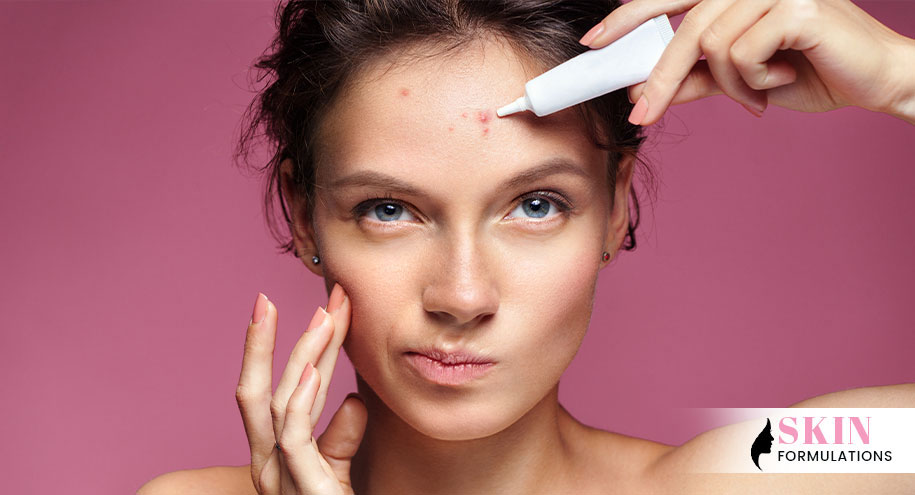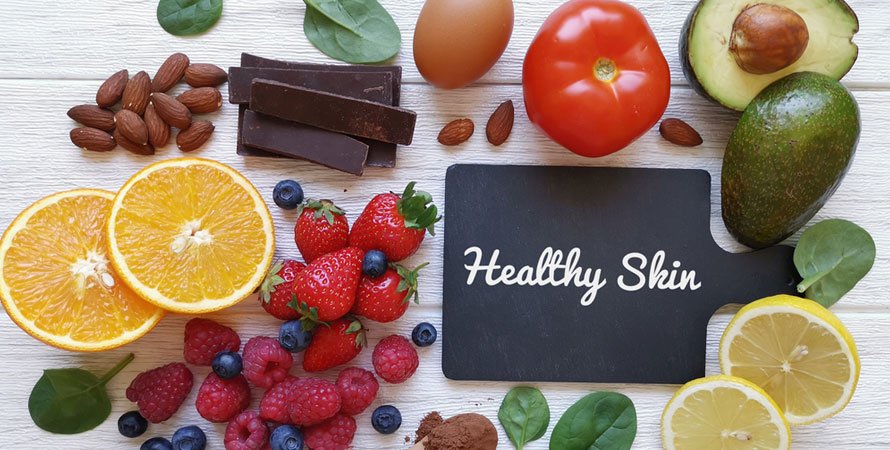Don’t Let Hidden Causes of Acne Ruin Your Skin: The Role of Food Intolerance in Breakouts.

Are you struggling with persistent acne despite trying topical treatments such as creams, lotions, and cleansers? Food sensitivities might be to a fault in that case. Recent studies have found a strong link between food intolerances and skin issues such as acne. In this blog post, we’ll explain the connection between food intolerance and acne so you can identify potential triggers and take steps to manage your diet for healthier skin. Let’s get started!
What is acne?
Acne is a common skin condition characterized by pimples, cysts, blackheads, and whiteheads on the face, chest, back, shoulders, and other areas. It can be triggered by hormonal changes or bacteria on the skin’s surface. Acne affects people of all ages and often begins during puberty when hormones are in flux. If left untreated, acne can cause permanent scarring and psychological distress. Thankfully there are treatments available to help clear up acne-prone skin. Common treatments include topical creams and ointments as well as oral medications such as antibiotics. Additionally, lifestyle factors such as diet and stress management can also play an important role in managing acne breakouts. By understanding the causes of acne and taking steps to treat it, you can achieve clear skin and improved self-confidence.
What causes acne?
Acne is a common skin condition that occurs when bacteria and oil get trapped in the pores causing red bumps, whiteheads, or blackheads. Other causes of acne include clogged pores, fluctuating hormones, heredity, stress, diet, and lifestyle habits such as touching your face too much and lack of sleep. It’s also important to note that certain medications can trigger acne breakouts due to their drying effects on the skin. To keep acne under control it’s important to understand the underlying cause and take steps to reduce it. For example, reducing stress levels by exercising regularly or practicing relaxation techniques like yoga or meditation can help reduce acne outbreaks. Additionally, maintaining a proper skincare routine with gentle cleansers and moisturizers can help keep skin clean and nourished. Finally, avoiding certain trigger foods such as dairy and processed foods can also improve acne symptoms. By understanding the various causes of acne, you can take steps to reduce flare-ups and achieve clearer skin for good.
By taking a holistic approach to treating your skin – understanding the link between food sensitivity and acne, incorporating healthy foods into your diet, controlling stress levels, and maintaining a skincare routine – you’ll be well on your way to clear, acne-free skin. Also, remember that it’s important to seek professional advice from a dermatologist if necessary so they can provide an individualized treatment plan that works best for you. These simple steps will ensure you’re on the right path to clear, healthy skin.
What is the link between food sensitivity and acne?
The link between food sensitivity and acne is that certain foods may trigger an inflammatory response in the body which can lead to skin breakouts. Common culprits include dairy, wheat, sugar, gluten, and processed foods. When the body has difficulty digesting these foods due to a lack of enzymes or other digestive issues, it can cause inflammation in the body and skin leading to unpleasant symptoms such as acne. To determine if you have food sensitivity, it’s important to track which foods you eat and any reactions that follow. If you suspect one of these foods is causing your acne flare-ups, it’s important to eliminate them from your diet for at least two weeks so you can see if there’s an improvement in your skin. Once you identify the problem foods, you can slowly reintroduce them into your diet in smaller amounts. By recognizing the link between food sensitivity and acne, you can take steps to identify and eliminate dietary triggers and achieve healthier clearer skin.
What are the signs of food intolerance?
Food intolerance occurs when the body has difficulty digesting certain foods due to a lack of enzymes or other digestive issues. This can cause inflammation in the body and skin leading to unpleasant symptoms such as nausea, bloating, stomach cramps, headaches, and even acne. Common foods that may trigger these reactions include dairy, wheat, sugar, gluten, and processed foods. To determine if you have food sensitivity, it’s important to track which foods you eat and any reactions that follow. If you suspect one of these foods is causing your acne flare-ups, it’s important to eliminate them from your diet for at least two weeks so you can see if there’s an improvement in your skin. Once you identify the problem foods, you can slowly reintroduce them into your diet in smaller amounts. By recognizing the link between food sensitivity and acne, you can take steps to identify and eliminate dietary triggers and achieve healthier clearer skin.
What are common food triggers?
Common food triggers for acne breakouts include dairy products, processed sugars and starches, wheat, and caffeine. Dairy products are known to trigger acne flare-ups due to their high-fat content and ability to increase oil production in the skin. Processed sugars and starches can also cause an increase in insulin levels which can lead to increased hormones causing acne breakouts. Wheat is another common food trigger due to its gluten content which may irritate the skin and cause inflammation leading to breakouts. Finally, caffeine can disrupt your body’s natural hormone balance, leaving your skin vulnerable and prone to breakouts. By avoiding these common triggers, you can greatly reduce the chances of experiencing an acne breakout.
By understanding the link between food sensitivity and acne, as well as identifying potential triggers, you’ll be well on your way to clear, healthy skin. Remember that it’s important to take a holistic approach by incorporating healthy foods into your diet, controlling stress levels, and maintaining a proper skincare routine – all of which can help reduce acne flare-ups. So make sure you pay attention to what you’re eating and how it affects your skin so that you can achieve the clearer complexion that you deserve!
How Can Diet Improve Acne?
In addition to avoiding trigger foods, incorporating certain healthy foods into your diet can greatly improve the appearance of acne. Foods like fruits and vegetables, whole grains, lean proteins, nuts, and seeds are packed with essential vitamins and minerals that can help boost immunity and support overall health. These types of foods also contain antioxidants which help reduce inflammation in the body leading to clearer skin. Eating a balanced diet rich in natural foods is an important step toward improving acne-prone skin. Additionally, eating smaller meals more frequently throughout the day helps keep blood sugar levels stable which can reduce breakouts. Limiting sugary drinks like soda and reducing caffeine intake can also help clear up acne-prone skin. By making smart dietary choices you can significantly reduce the severity of your acne and achieve healthier, clearer skin.
Overall, by understanding the link between food sensitivity and acne and taking steps to reduce triggering foods from your diet, you can take control of your skin health and get clear skin for good. With a proper diet, lifestyle changes such as getting adequate rest, and stress management can also play an important role in managing acne breakouts. By understanding the causes of acne and taking steps to treat it, you can achieve clear skin and improved self-confidence.
Can some foods help?

In addition to avoiding certain trigger foods, you can also incorporate certain foods into your diet to help clear up acne. Foods that contain antioxidants, such as tomatoes and blueberries, are especially beneficial because they help reduce inflammation and fight free radicals which can cause skin damage. Eating a variety of fruits and vegetables is also important as they provide essential nutrients and vitamins needed for healthy skin. Foods rich in zinc, such as nuts and legumes, can also help fight acne breakouts due to their anti-inflammatory properties. Finally, consuming lean proteins like fish or skinless chicken will help keep your skin looking its best by providing amino acids needed for protein synthesis which helps improve overall skin health.
Conclusion
Acne is a common skin condition that can be caused by food sensitivity. By understanding the link between food and acne, you can identify specific foods that may trigger breakouts and take steps to reduce them with your diet. Additionally, incorporating nutritious foods into your diet can help provide essential vitamins and minerals for healthy skin. With a proper diet and lifestyle changes, such as getting adequate rest and stress management, you can take control of your skin health and achieve clear skin for good. The key is to take a holistic approach by understanding what triggers your acne outbreaks and taking steps to reduce or eliminate them from your diet while also eating nutritious foods that promote healthy skin. By following these tips you can have clearer skin in no time!







